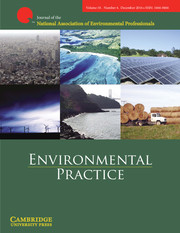We have to understand more and work together better, or a few decades from now we may all be extremely sorry we refused to be enlightened. All those involved in environmental science and technological research are extremely important, but I also continue to believe in the need to teach environmental history and policy so that the upcoming generations can understand where environmentalists (although I am not really happy with that name) come from, what mistakes were made in the past, what it took—and who it took—to rectify them, and what they should be guarding against in their own future.—From “An Interview with Lynton Caldwell on the National Environmental Policy Act,” 2003, Environmental Practice 5(4):281–286.
Lynton Keith Caldwell was, to our knowledge, never a member of the National Association of Environmental Professionals (NAEP), although he collaborated with a few NAEP members and Environmental Practice editorial board members at times and also appeared in Environmental Practice. His work as an academic and as a consultant to Congress has had profound impacts on the NAEP, however. Indeed, Caldwell's immense input into and co-writing of the National Environmental Policy Act (NEPA) in the late 1960s created the conditions that made it necessary to organize the NAEP. When agencies first started to prepare Environmental Impact Statements (EISs), there were no professional associations dedicated to the problem solving that NEPA demanded. The NAEP brought together people struggling to prepare EISs in a scientifically sound and ethical manner.

Subsequently, many states passed their own versions of NEPA (see, for example, article by Diane Mas in Environmental Practice's NEPA Special Issue, where she compares NEPA and the state environmental policy acts of Connecticut, Massachusetts, North Carolina, and Washington State1
D. M. L. Mas, 2003, “A Comparison of Three Key Elements of National and Select State Environmental Policy Acts,” Environmental Practice 5(4):349–362.
D. A. Bronstein, D. Bear, H. Bryan, J. F. DiMento, and S. Narayan, 2005, “The National Environmental Policy Act at 35,” Environmental Practice 7(1):3–5.
Caldwell passed away on August 15, 2006, at the age of 92. Perhaps many of the younger people in the environmental professions have never even heard of him. This is not surprising, because 1969—the year of NEPA's passage in Congress—is a long time ago and environmental work is now so thoroughly established that one can be forgiven for thinking that things have always been this way. In this issue, we have assembled a special section that acknowledges his enormous contributions and celebrates the good work that he did. By doing so, we hope to further, in some small way, the environmental educating and “interchange of information and ideas”3
L. K. Caldwell, 2000, “Can American Society Make Sound Environmental Decisions?” Environmental Practice 2(2):130–134.


